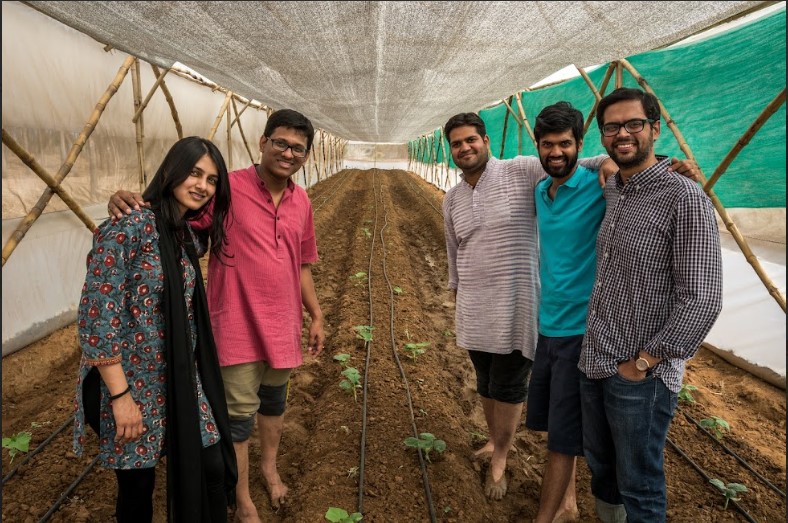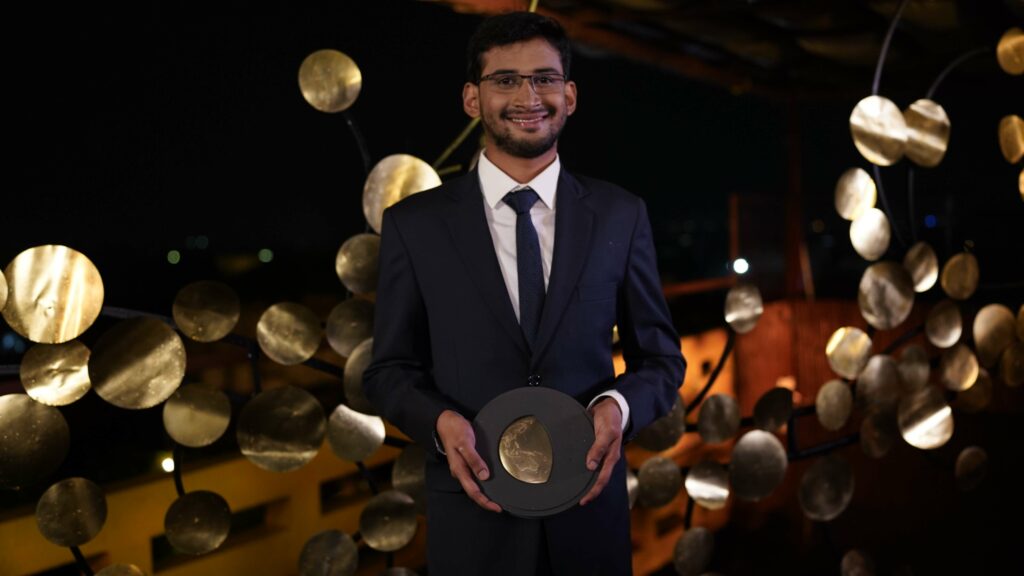(October 26, 2023) Of the world’s 570 million farms, over 80 percent cover less than two hectares, the size of three football pitches. Together, these small-holding farms produce a third of our food, but those who farm them are among the poorest people on the planet and the most affected by climate change. It was to address this inequality that the start-up, Kheyti, was founded in 2015 by Ayush Sharma, 37, Saumya Sahay, 33, and Kaushik Kappagantulu, 36. It’s a “greenhouse-in-a-box” concept—an affordable, modular greenhouse that uses 90% less water than standard greenhouses, grows seven times more food, and gives farmers a steady, dependable income.
The founders knew each other, as they had worked with each other in different capacities earlier, and all of them were keenly interested in helping fight issues facing smallholder farmers.
The start-up won the coveted Earthshot Prize in 2022 and took home the eye-watering prize money of one million pounds. Founded by Prince William (of the British Royal family), the awards are dubbed Eco-Oscars, and Kheyti won the award in the ‘Protect and Restore Nature’ category because of its novel low-technology solution.
Greenhouse in a box
Kheyti’s innovation is that they have created a durable greenhouse that cuts off heat, prevents bugs, and saves water. The combination of three is helping small farmers earn an extra profit of Rs 60000 to Rs 1 lakh per year.
The start-up’s vision is to see a world where every farmer is climate-resilient through easy access to climate-smart farm technologies. Kaushik explains, “Since our inception, the biggest challenge in democratizing technologies democratising small farmers for cost. Greenhouses are not new, they have been around for decades. However, conventional greenhouses are expensive and are normally only available in commercial sizes new; acre to 1 (½A small farmer who owns 1-2 acres of land can never afford to spend acre). lakh 30–40 acre to buy a greenhouse, even with government subsidy.”
Also, the existing greenhouses were also primarily made for export crops and not really for conventional fruits and vegetables that the smallest farmers in India grow. Kheyti overcame this challenge by putting the small farmer first and designing for them.
“We started with talking to 1000+ small and marginal farmers and tried to understand what a greenhouse designed for them and by them would look like,” Ayush tells Global Indian and adds, “We tried to understand what the protection requirements were for the horticulture crops that they grow, consume, and. This is what led us to design our first version of our greenhouse.”

Team Kheyti
Innovation for a change
The team continued to experiment over nine iterations for six years and included hundreds of farmers in the design process.
Kheyti not only managed product evolution but also succeeded in bringing down cost from Rs 3 lakhs to Rs 65,000. Apart from experimenting with material, a game changer was that while the standard size of a greenhouse available was an acre, they got it down to one tenth of an acre, thereby bringing the cost down. It is the first greenhouse that works for Indian small and marginal farmers.
While greenhouses were usually earmarked for exotic veggies like broccoli and lettuce, the start-up adapted them for wider use (almost all Indian vegetables, from cabbages to cauliflowers, leafy vegetables, and other common ones like tomatoes and potatoes, among others), created protocols for use, and started enabling them for wider use. This meant that the farmer’s produce too had a wider base, as the exotic vegetables were only consumed by niche households and had a limited clientele.
The entrepreneurs installed their first greenhouse in 2017 in Siddipet (Telangana) before expanding to seven states across India, including parts of Uttar Pradesh, Madhya Pradesh, and Orrisa, among others. Along the way, they have also raised five million dollars in seed funding.
Customer-driven
The most important lesson the founders have realised along the way is to be 100% customer and problem obsessed, not solution obsessed. Saumya says. “Too often, and I am guilty of this too, we are solution obsessed—we start with an interesting idea and try to find a market, customer, or problem to apply that idea to. This is important because entrepreneurs have to be excited about the idea.”
However, the team at Kheyti has learned the importance of being customer- and problem-focused. A good way to do this is by “apprenticing with the problem,” as Kaushik has done. Before starting Kheyti, he spent five years working at another startup and living and working in rural India.
He recalls. “Just before starting Kheyti, my cofounders and I spent six months travelling across India talking to around 1,000 farmers. All of that apprenticing helped us clearly see the challenges that climate change posed to agriculture. Only after all of that did we start looking at solutions and then come up with the idea of the greenhouse-in-a-box.”
View this post on Instagram
Global fame
Winning the Earthshot prize has landed the start-up in the global limelight. Kaushik explains. “The problems we are trying to solve—rural poverty, climate change—are big problems that cannot be solved by Kheyti alone. When I started working in rural India 15 years ago after studying at IIT, nobody wanted to get into this sector. Today, a whole host of young people, investors, and experienced professionals want to work in AgriTech.”
Forums like the Earthshot Prize helped the business spread awareness and optimism. Through their exposure, they now partner with funders, government officials, and potential employees—all needed if they are to achieve their vision.
Kheyti’s most important value is farmer-centricity. Kaushik agrees: “Farmers are our reason for existing and are at the centre of what we do. If we hold that value, every crop becomes as important to us as it is to the farmer, and therefore the ‘difficulty’, in my opinion, becomes a moot point.”
Kheyti is currently at the beginning of an ambitious 5-year plan to scale their work to 100,000 farmers and create a foundation to reach a million farmers. They currently work with 3000 farmers, 90% of whom they added in the last 18 months. Focused currently on executing on the ground and building the organisation to scale, these young entrepreneurs are a catalyst for turning around the fortunes of small farmers.
- Follow Kheyti on Instagram



